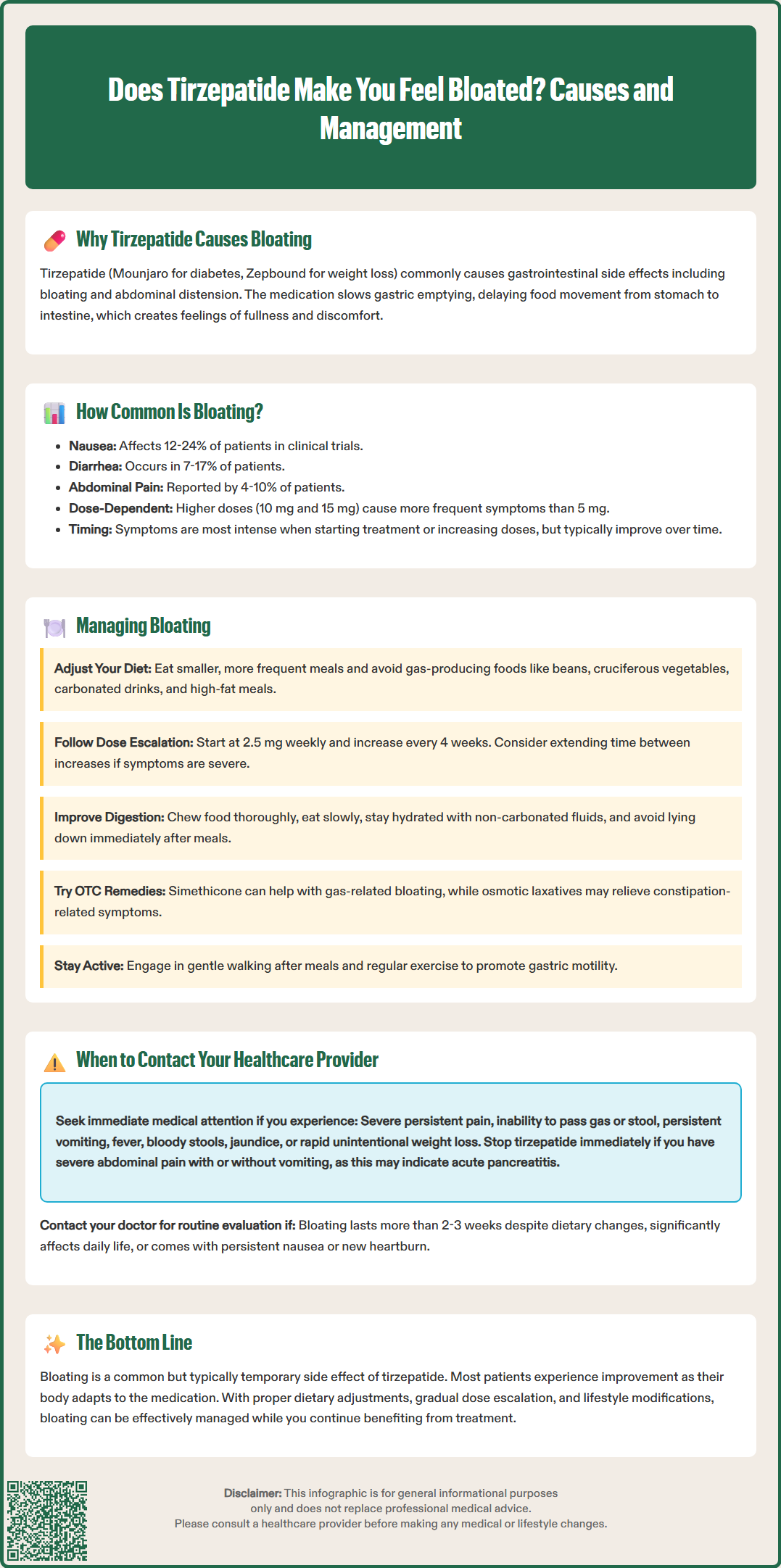LOSE WEIGHT WITH MEDICAL SUPPORT — BUILT FOR MEN
- Your personalised programme is built around medical care, not willpower.
- No generic diets. No guesswork.
- Just science-backed results and expert support.
Find out if you’re eligible

Does tirzepatide make you feel bloated? This is a common concern for patients starting this dual GIP and GLP-1 receptor agonist medication. Tirzepatide, marketed as Mounjaro for type 2 diabetes and Zepbound for weight management, works by slowing gastric emptying, which can lead to feelings of abdominal fullness and distension. While "bloating" isn't specifically listed in FDA prescribing information, related gastrointestinal symptoms like abdominal distension and dyspepsia are frequently reported. Understanding why bloating occurs, how common it is, and effective management strategies can help patients navigate this side effect while maintaining the therapeutic benefits of tirzepatide.
Quick Answer: Tirzepatide can cause feelings of bloating through its mechanism of slowing gastric emptying, though this symptom typically improves with continued use and is manageable with dietary modifications.
Tirzepatide is a dual glucose-dependent insulinotropic polypeptide (GIP) and glucagon-like peptide-1 (GLP-1) receptor agonist approved by the FDA for type 2 diabetes management (Mounjaro) and chronic weight management (Zepbound). While the term "bloating" specifically is not listed in the FDA prescribing information, related gastrointestinal symptoms such as abdominal distension and dyspepsia are among the commonly reported side effects with tirzepatide therapy.
The mechanism by which tirzepatide may contribute to feelings of bloating relates to its pharmacological action on the gastrointestinal tract. As a GLP-1 receptor agonist, tirzepatide slows gastric emptying, which delays the movement of food from the stomach into the small intestine. This delayed gastric emptying can lead to feelings of fullness, abdominal distension, and discomfort in some patients. Importantly, this gastric-emptying effect is most pronounced after initial doses and tends to diminish with continued use.
Clinical trial data from the SURPASS and SURMOUNT studies demonstrate that gastrointestinal adverse events—including nausea, diarrhea, vomiting, constipation, and abdominal discomfort—occur frequently with tirzepatide. While "bloating" as a specific term appears less frequently in formal adverse event reporting, patients often describe sensations of abdominal fullness, distension, or discomfort that align with bloating symptoms. These effects are generally dose-dependent and tend to be most pronounced during dose escalation phases or when initiating therapy.
Precise incidence rates for bloating specifically are not comprehensively reported in tirzepatide clinical trials, as these symptoms may be captured under broader categories such as "abdominal distension," "dyspepsia," or "abdominal discomfort." However, gastrointestinal adverse events collectively affect a substantial proportion of patients receiving tirzepatide therapy.
In the pivotal SURPASS trials evaluating tirzepatide for type 2 diabetes, gastrointestinal side effects varied by dose. According to the FDA prescribing information for Mounjaro, nausea occurred in 12-24% of patients (increasing with dose), diarrhea in 7-17%, and vomiting in 2-10%. Abdominal pain was reported in 4-10% of patients, and dyspepsia in 3-9%, depending on the dose. The SURMOUNT-1 trial for weight management showed similar patterns, with gastrointestinal events being the most common adverse reactions and a leading cause of treatment discontinuation.
Abdominal distension specifically was reported in clinical trials, though at lower rates than nausea or diarrhea. These symptoms appear to be more common during the initial weeks of treatment and following dose increases. Most patients experience improvement in these symptoms over time as physiological adaptation occurs. The severity is typically mild to moderate, though a small percentage of patients may experience persistent or bothersome symptoms that affect quality of life.
It's worth noting that gastrointestinal side effects tend to be dose-related, with higher incidence at the 10 mg and 15 mg weekly doses compared to the 5 mg dose. This dose-dependent pattern informs the gradual titration schedule recommended in the prescribing information.

Effective management of bloating during tirzepatide therapy involves both pharmacological considerations and lifestyle modifications. Healthcare providers should counsel patients on evidence-based strategies to minimize gastrointestinal discomfort while maintaining therapeutic efficacy.
Dietary modifications represent the first-line approach to managing bloating. Patients should be advised to:
Eat smaller, more frequent meals rather than large portions, which can exacerbate delayed gastric emptying
Reduce intake of gas-producing foods such as beans, cruciferous vegetables, carbonated beverages, and high-fat meals
Consider limiting foods high in fermentable oligosaccharides, disaccharides, monosaccharides, and polyols (FODMAPs) as a trial if symptoms persist (ideally with dietitian guidance)
Chew food thoroughly and eat slowly to reduce air swallowing
Stay well-hydrated with non-carbonated fluids throughout the day to help prevent constipation
Avoid lying down immediately after meals to facilitate gastric emptying
Medication timing and dosing strategies can also help minimize bloating. The gradual dose escalation schedule recommended in the FDA label (starting at 2.5 mg weekly and increasing every 4 weeks) allows for physiological adaptation. According to the prescribing information, tirzepatide can be administered any time of day, with or without food, but keeping the day consistent is important. Some patients may benefit from extending the time between dose increases if gastrointestinal symptoms are problematic.
Adjunctive therapies may provide symptomatic relief in select cases. Over-the-counter simethicone can help reduce gas-related bloating. For constipation, gradual fiber introduction and osmotic laxatives may be helpful. Probiotics have limited evidence specific to tirzepatide-related bloating but might support gastrointestinal function in some patients. Patients should consult their healthcare provider before adding any supplements or medications, especially those that might further slow GI motility.
Physical activity, particularly gentle walking after meals, can promote gastric motility and reduce feelings of bloating. Regular exercise also supports the metabolic benefits of tirzepatide therapy.
While mild bloating is generally manageable with conservative measures, certain symptoms warrant prompt medical evaluation to rule out serious complications or alternative diagnoses. Patients should be educated on red flag symptoms that require clinical assessment.
Immediate medical attention is necessary if bloating is accompanied by:
Severe, persistent, or worsening abdominal pain that does not resolve with position changes or over-the-counter remedies
Inability to pass gas or have bowel movements, suggesting possible bowel obstruction
Persistent vomiting, particularly if unable to tolerate oral fluids, raising concern for gastroparesis or pancreatitis
Signs of dehydration (dizziness, reduced urination, dark urine)
Fever, which may indicate infection or inflammation
Bloody or black tarry stools
Right upper quadrant pain or jaundice (yellowing of skin or eyes), which may suggest gallbladder disease
Unintentional rapid weight loss beyond expected therapeutic effects
Patients should stop tirzepatide and contact their healthcare provider immediately if they experience severe or persistent abdominal pain, with or without vomiting, as these may be symptoms of acute pancreatitis.
Routine consultation with a healthcare provider is appropriate when:
Bloating persists beyond 2-3 weeks despite dietary modifications and dose stabilization
Symptoms significantly impair quality of life or daily functioning
Bloating is accompanied by persistent nausea, early satiety, or regurgitation, which may suggest severe gastroparesis
New or worsening heartburn or reflux symptoms develop
There is concern about medication interactions or the need for dose adjustment
Healthcare providers should evaluate for potential complications of tirzepatide therapy, including acute pancreatitis (characterized by severe epigastric pain radiating to the back, nausea, and elevated lipase levels) and severe gastroparesis. A thorough history, physical examination, and appropriate laboratory or imaging studies may be warranted based on clinical presentation. In some cases, temporary dose reduction, treatment interruption, or discontinuation of tirzepatide may be necessary if symptoms are severe or persistent despite conservative management.
Bloating from tirzepatide is typically most pronounced during the first few weeks of treatment and following dose increases. Most patients experience improvement as physiological adaptation occurs, usually within 2-3 weeks of dose stabilization.
Over-the-counter simethicone may help reduce gas-related bloating, and osmotic laxatives can address constipation. However, patients should consult their healthcare provider before adding any medications or supplements, especially those that might further slow gastrointestinal motility.
No, bloating is actually related to tirzepatide's mechanism of action—slowing gastric emptying—which contributes to its therapeutic effects. The presence of mild bloating does not indicate treatment failure and typically improves with continued use and dietary modifications.
All medical content on this blog is created using reputable, evidence-based sources and is regularly reviewed for accuracy and relevance. While we strive to keep our content current with the latest research and clinical guidelines, it is intended for general informational purposes only.
This content is not a substitute for professional medical advice, diagnosis, or treatment. Always consult a licensed healthcare provider with any medical questions or concerns. Use of this information is at your own risk, and we are not liable for any outcomes resulting from its use.